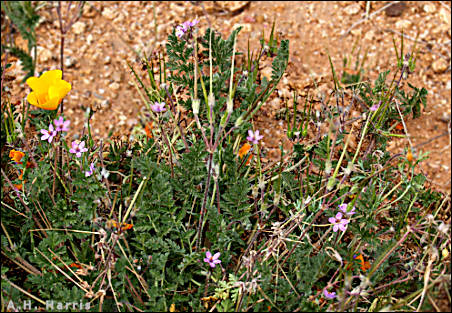

Storks have a long history in fable and myth. According to one story, a woman named Gerana hated the gods. Shortly after she had a child, as punishment for her hatred, the goddess Hera turned her into a stork. The stork, desperate to get to her baby, was driven away, everyone thinking that a bird was trying to abduct the baby. From this, it is said, arose the myth of storks carrying babies. A stork likewise played a part in one of Aesop's fables. Nets placed by a farmer to protect his newly planted seeds caught numerous cranes and, among them, a stork. Although the stork plead for its life, the farmer noted that he had caught the stork with the robber cranes, and thus they must die together. After all, birds of a feather flock together!
On a more pleasant note, there is a dainty little plant of the
Chihuahuan Desert known as Stork's-bill, whose small purplish flowers grace early
springtime. Picture a forest of bill-shaped fruits pointed skyward, and the name comes
as no surprise.

Listen to the audio.
Contributor: Arthur H. Harris, Laboratory for Environmental Biology, Centennial Museum, University of Texas at El Paso.
Desert Diary is a production of KTEP, National Public Radio for the Southwest at the University of Texas at El Paso.

Flowers, fruit, and foliage of Stork's-bill, probably Erodium cicutarium, El Paso, TX. Note the bill-like (or sword-like) fruits pointed skyward. Photograph by A.H. Harris
Archive of Central Texas Plants